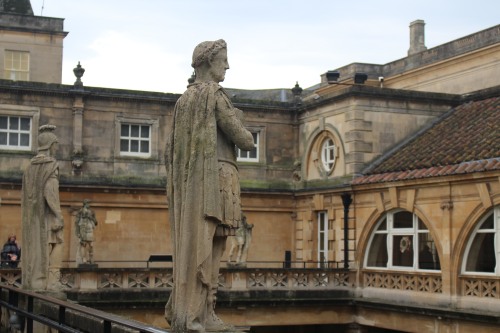"No, To Poor Caesars"
The dusky crunch hour,
and, oh my laughing Christ,
The likenesses of you I have smashed in my
Byzantine minutes!
Eyes closed: Push, push! Onward to unwelcome reflections.
At the proverbial center of gravity,
(call it the facsimile of Jerusalem)
Sleep is fitful.
The matriarch again has her invitation,
Which means another inventory of losses.
I awake with the gods Constantine banished;
Mine is a struggle for the forbidden.
Is the saint's annual procession today?
Will Persia merge with it today?
Is today when Asia will uncross her legs?
It's believed that deities commonly disappear East;
Might explain its call to Alexander,
And later Caracalla: the Great Wanna Be.
Yes - the procession begins; the saint's relics are there
For reflection.
The West is a relic, and hence I've not rested.
Stepping off a mutilated icon, I proceed East,
Where Sleep must've accepted an invitation.

statues of Roman emperors, Bath, England -- George Anderson Lawson
“Caesar” was the imperial Roman title. It was derived from the dictator Gaius Julius Caesar, who was assassinated in 44 BCE. In his will he adopted his maternal great-nephew Gaius Octavius, then known as Octavianus, who gradually assumed complete control over the empire. As he consolidated his power he eschewed monarchical titles, calling himself “princeps civitatis” (first citizen of the state) and “imperator Caesar” to emphasize his connection to his predecessor. In 27 BCE the senate added the “Augustus” honorific (majestic, venerable). His formal name was Imperātor Caesar Dīvī Fīlius Augustus. When he died in 14, he was succeeded by his stepson Tiberius Claudius Nero, who then married Octavianus’ daughter and was adopted as Tiberius Julius Caesar in 4; his regnal name was Tiberius Caesar Dīvī Augustī Fīlius Augustus; this set the precedent of the emperor designating his successor by adopting him and giving him the Caesar name. The 4th emperor, Claudius, who was installed by the Pretorian guard after Caligula’s assassination, was the first to assume the name "Caesar" upon accession without having been adopted by the previous emperor; however, he was Octavianus’ maternal great-nephew, Tiberius’ nephew, and Caligula’s uncle. He adopted his stepson and grand-nephew Lucius Domitius Ahenobarbus and made him a "Caesar" (whoruled as Nerō Claudius Caesar Augustus Germanicus and is generally known as “Nero”). When Nero killed himself in 68, the usurper Servius Sulpicius Galba took the imperial throne under the name Servius Galba Imperator Caesar though he had no kinship to the Caesar family, and he gave the name to his own adopted heir, but after 7 months he was deposed by Marcus Otho, who sometimes used the title Nero before assuming the title Caesar (Marcus Salvius Otho Caesar Augustus). After a 3-month reign he committed suicide and was followed by Aulus Vitellius Germanicus Imperator Augustus, and he bestowed the name Germanicus on his son. But he was assassinated after 8 months, and Vespasiānus restored the Caesar name to the imperial title (as Titus Flāvius Caesar Vespasiānus Augustus) and it became a part of the official title from then on. (During the time of Octavianus, Jesus had instructed people to "Render therefore to Caesar the things that are Caesar’s; and to God, the things that are God’s.") In 198 Marcus Aurelius Antoninus (who was born Lucius Septimius Bassianus) took the throne as Marcus Aurelius Severus Antoninus Augustus, who was generally known as “Caracalla” because of the Gallic hooded tunic he habitually wore. In the 4th century Flavius Valerius Aurelius Constantinus Augustus legalized Christianity.
ReplyDeleteAsia was the daughter of the Titans Oceanus and Tethys. Apollodōros ho Athēnaios (Apollodorus of Athens) said she was the wife of Iapetus and mother of Atlas and Prometheus. (Much earlier Hesiodos had claimed they were the children of Clymene, another Oceanid, but Clymene was also regarded as the mother of Phaethon by Helios.) Herodotus wrote that Asia (Anatolia and the Persian empire) was named after the wife of Prometheus, though Acusilaus and Aeschylus called his wife Hesione. Herodotus wondered why Asia, Europa, and Libya [Africa] were all named after women. He also related a Lydian tradition that Asia was named after Asies, the grandson of Manes (the son of Zeus and Gaia, the ancestor of the kings of Lydia) and his wife Callirhoe, yet another Oceanid. Gaius Plinius Secundus was one of the first to use Asia as the name of the whole continent rather than the area of Lydia.
ReplyDeleteThe Mycenaean states were destroyed ca. 1200 BCE; many of their clay diurnal administrative records were baked into permanent relics when their palaces were burned. A cache found at Pylos included references to “aswiai” (women of Asia); a singular form, “Aswia,” refer to a woman but also to her place of origin, part of a region known to the Hittites as Assuwa (centered on Lydia, later known as "Roman Asia," in west-central Turkey) when they conquered it ca. 1400 BCE. There was also an Akkadian word “(w)aṣû(m)” (to go outside or to ascend), which referred to the direction of the sunrise and was probably connected with the Phoenician “asa” (east).; similarly, the Akkadian “erēbu(m)” (to enter or to set), and the Phoenician “’ereb” (west), may have been the source of “Europe,” which the Greeks personified as Europa, the Phoenician mother of king Minos of Crete via Zeus. (Another Europa was also the daughter of Oceanus and Tethys).